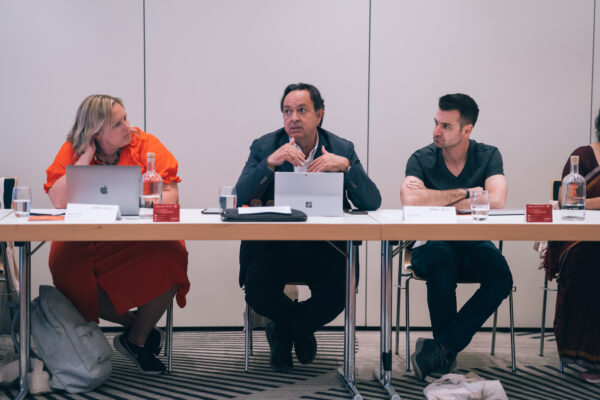Alexandra teaches a Master of Strategic Global Corporate Communication at the University of Colorado.
Self-awareness is often talked about in leadership circles—but not always understood. It’s not just about knowing your strengths or being aware of your blind spots. For leaders operating across cultures, markets, and geographies, self awareness in leadership is a strategic advantage and an essential component of long-term success. Without it, even the most technically skilled leaders can falter in realizing their leadership potential. Implementing actionable strategies can significantly improve self-awareness and leadership skills, enabling leaders to effectively tackle challenges and enhance their capabilities.

At IPREX, where our partner agencies span the globe, we see this play out in real time. Success in cross-border collaboration, client relationships, and crisis response often hinges on a leader’s ability to reflect, adapt, and communicate with empathy. It starts from the inside out—with true awareness, emotional insight, and self regulation. This self-awareness can have a profound impact on leadership effectiveness and organizational success, enhancing emotional intelligence, decision-making, and team dynamics.
In this article, I draw from my work with graduate students to illustrate how we explore and develop self-awareness leadership as part of a comprehensive leadership development journey. While the theory is built for the classroom, the principles apply far beyond it—to anyone building or managing global teams, navigating cross-cultural dynamics, or leading with purpose across borders.
Here’s why building self awareness isn’t just a nice-to-have—it’s a must-have for effective leaders looking to sustain impact in diverse environments.
Introduction to Self-Awareness in Leadership

Self-awareness is a fundamental building block for effective leadership, enabling leaders to understand their strengths, weaknesses, and emotions, and how these factors impact their behavior and decision-making. Developing self-awareness is essential for leadership development, as it allows leaders to recognize their thought processes, biases, and emotional triggers, leading to better decision-making and more effective communication. By practicing self-awareness, leaders can gain a deeper understanding of themselves and their impact on others, ultimately leading to increased leadership effectiveness and a positive work environment.
Self-Awareness Is the Foundation of Intercultural Competence

Global competence isn’t defined by how many stamps are in your passport. It’s rooted in your ability to recognize how your personal culture—your values, assumptions, communication style—affects the way you interact with others, requiring a deep understanding of oneself and how these aspects influence others.
Exceptional leaders are acutely aware of the lens through which they see the world. They’re intentional about uncovering their emotional triggers, seeking new insights, and adjusting behaviors that could limit connection, trust, or credibility in unfamiliar settings. This kind of impact mindset enables leaders to stay grounded and curious, even in high-stakes or ambiguous situations.
In the Master of Arts in Corporate Communication (MACC) program at the University of Colorado Boulder, I emphasize this early. Before students dive into strategy, they examine their personality traits, thought processes, and strengths and weaknesses—to build awareness before trying to build influence or leadership skills.
Lack of Self-Awareness Is a Critical De-railer—Especially at the Top
Most leaders don’t lose their way because they lack technical skill. They falter because they stop paying attention—to themselves and to how they’re being perceived. The higher you climb, the less likely anyone is to offer unfiltered feedback. Without intentional self-reflection and a willingness to seek feedback, leaders risk losing the self awareness that once made them effective.
This becomes even more precarious in global settings. What reads as confident in one culture may seem confrontational in another. Leaders who don’t practice honest communication—or who interpret every interpersonal challenge as a personal attack—can quickly shut down dialogue and trust. It’s not the pressure that derails them; it’s the blind spots. That’s why the importance of self awareness cannot be overstated—it protects leaders from their own unexamined patterns.
Emotional Intelligence Is a Core Leadership Capability

Emotional Intelligence (EI) is not a soft skill. It’s a core aspect of building leadership capabilities that directly ties into developing leadership skills. At its heart, EI is about recognizing your own emotions, managing them constructively, and reading the emotions of others with care.
In global settings, this becomes essential. You’re not just interpreting tone or body language—you’re navigating layers of cultural nuance. What does disagreement look like here? How is respect shown? What kind of silence signals disengagement?
Tools like the Global Leadership Foundation’s Emotional Intelligence Test help effective leaders practice mindfulness, assess leadership style, and improve overall performance. These tools don’t just enhance productivity—they strengthen the very foundation of leadership development by fostering self awareness, self regulation, and the kind of impact mindset that drives positive, sustainable change.
Self-Awareness Leads to Better Communication

Communication isn’t just about clarity. It’s about context. A self-aware leader understands how their words, tone, and timing land in different environments. They pause before sending that Slack message. They ask rather than assume. They adapt—not to perform, but to connect.
This is where Tracy Williams, CEO of Olmstead Williams Communications, excels. With decades of experience working across borders, in my course she reinforces that being understood isn’t about saying more—it’s about saying what matters, in the way your audience is ready to hear it.
Global leaders who are self-aware are also better listeners. They know when to lean in, when to give space, and how to spot the signals that might otherwise be missed.
Communication isn’t just about clarity—it’s about context. Self-aware leaders understand how their words and timing land differently across audiences. They adapt—not to impress, but to connect.
This is where Tracy Williams, CEO of Olmstead Williams Communications, brings real depth. With decades of experience working across borders, she shows students that good leaders don’t communicate to impress—they communicate to connect. That requires honest communication, clarity of intent, and the discipline to listen more than they speak. In my course, she reinforces that being understood isn’t about saying more—it’s about saying what matters, in the way your audience is ready to hear it. That often means pausing, reframing, and receiving feedback without defensiveness.
The result? Better decision making, smoother alignment, and a positive work environment where multiple perspectives are valued. But the impact doesn’t stop at internal culture. For communicators and agencies, this level of self awareness in leadership sharpens how we engage with audiences—helping us move beyond assumptions, craft messages that resonate, and respond with empathy rather than defensiveness. Whether you’re managing a team or shaping a brand narrative, the ability to adapt, practice honest communication, and truly listen is what drives meaningful connection.
Self-Awareness Unlocks Empathy—Which Builds Trust

Empathy isn’t about being agreeable—it’s about seeing the experience through someone else’s lens. That kind of connection requires a deeper understanding of your own filters. It means recognising how your assumptions shape your view, and adjusting your leadership accordingly.
Janel Joseph, Executive Coach and Fellow of the Global Leadership Foundation, speaks to this powerfully in my course. She shows trust doesn’t come from knowing everything—it comes from personal and professional growth, from the ability to practice self awareness and meet people where they are.
This isn’t just relevant in team dynamics—it’s just as critical in stakeholder engagement, client relationships, and community partnerships. Empathy, grounded in self awareness, is what separates transactional leadership from transformative leadership. It drives stronger leadership outcomes by building trust, encouraging communication, and creating alignment—whether you’re managing a team or navigating high-stakes conversations with clients.
Reflection is a Strategic Practice—Not a Personal Luxury
Too often, self-awareness is framed as introspective or even indulgent (or perhaps that’s just the Australian in me talking?). But the truth is, successful leaders carve out time for reflecting—because they know reflection leads to continuous growth and more informed decisions.
In the MACC program, I ask students to reflect with intention. To name their growth areas. To own their story. And to connect it to professional development. This is what sets apart young leaders who grow, from those who stall.
Later in their careers, these students aren’t blindsided by change, because they’ve already built the internal muscle to adapt.
Vulnerability Builds Credibility

The myth of the all-knowing leader is just that—a myth. In multicultural teams and cross-border partnerships, credibility doesn’t come from certainty. It comes from humility. From leaders who are open about what they don’t know and willing to listen, learn, and evolve. Vulnerability and self-awareness contribute significantly to a positive working environment, fostering trust and collaboration.
When you lead through ambiguity, it’s not your confidence but your self knowledge that earns trust. It’s being able to say, “I don’t have all the answers, but I’m listening.” That level of authenticity creates space for constructive criticism, collaboration, and real alignment.
Self-Aware Leaders Shape Culture—From the Inside Out
Culture isn’t defined by posters, policies, or mission statements—it’s shaped by what leaders model. A young leader can benefit from self-awareness in shaping organizational culture by developing communication skills and the ability to build trust. How they show up, what they reward, what they challenge, and how they communicate all send signals. Self-aware leaders create cultures where receiving feedback is safe, honest communication is expected, and personal growth is part of the job—not a side benefit.
These are the environments where people do their best work, where leadership style aligns with purpose, and where continuous growth is supported. And that matters not just for internal teams, but for how agencies engage with clients, partners, and audiences. Culture, after all, doesn’t stop at the office door—it shapes how we show up in every relationship.
Know Yourself. Then Lead Others.

A self aware leader understands that self-awareness is the fundamental building block of long-term impact. And it’s not something you do once during a leadership retreat. It starts now—before the next team meeting, client pitch, or project kickoff—and continues every time you receive feedback, face a challenge, or make a call under pressure.
Exceptional leaders make self reflection part of their process. They schedule it like strategy work. They use it to uncover emotional triggers, revisit assumptions, and adapt their leadership style with intention. This isn’t about overthinking—it’s about building a rhythm that supports better decision making, honest communication, and continuous improvement.
If you’re leading across borders, industries, or cultures, this internal work isn’t a side task. It’s the skill that enables every other skill. The clearer you are about your own lens, the better you can see—and lead—through others’.

The IPREX Advantage
This is where IPREX adds real value. Our network gives agency leaders rare access to different perspectives in action. Through real collaboration—on real projects, with real clients—leaders strengthen their ability to flex, listen, and lead across markets. This collaboration enhances their leadership capabilities by fostering self-awareness and encouraging continuous personal growth.
It’s a chance to put all of this into practice: building self awareness, applying effective leadership tools, and pushing toward continuous improvement—together. For global leaders, IPREX isn’t just a network. It’s a proving ground. Get in touch.
About My Work with the CU MACC Program
 I’m fortunate to work with the Master of Arts in Corporate Communication (MACC) program at the University of Colorado. It’s fast-paced, fully online, and purpose-built for professionals aiming to lead with intention. Whether you’re stepping up, pivoting careers, or refining your global edge, this program offers the insights and tools to help you grow. It specifically supports the development of a young leader by enhancing self-awareness, communication skills, and the ability to build trust within organizational culture.
I’m fortunate to work with the Master of Arts in Corporate Communication (MACC) program at the University of Colorado. It’s fast-paced, fully online, and purpose-built for professionals aiming to lead with intention. Whether you’re stepping up, pivoting careers, or refining your global edge, this program offers the insights and tools to help you grow. It specifically supports the development of a young leader by enhancing self-awareness, communication skills, and the ability to build trust within organizational culture.
If you’re ready to lead with purpose, explore the program. You can learn more and request information here.
AI tools were used in the creation of this article.


